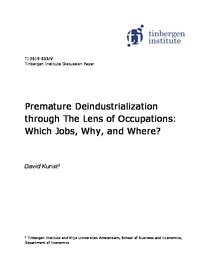Premature deindustrialization through the lens of occupations: which jobs, why, and where?
"A recent literature documents that manufacturing employment growth in developing countries has been sluggish over the past decades, and that deindustrialization has often set in at historically low levels of income. However, there is little evidence on which kind of jobs are disappearing prema...
| Main Author: | |
|---|---|
| Institution: | ETUI-European Trade Union Institute |
| Format: | TEXT |
| Language: | English |
| Published: |
Amsterdam
2019
Tinbergen Institute |
| Subjects: | |
| Online Access: | https://www.labourline.org/KENTIKA-19308396124911265789-Premature-deindustrialization-.htm |
| _version_ | 1771659901899112449 |
|---|---|
| author | Kunst, David Francisco |
| author_facet | Kunst, David Francisco |
| collection | Library items |
| description | "A recent literature documents that manufacturing employment growth in developing countries has been sluggish over the past decades, and that deindustrialization has often set in at historically low levels of income. However, there is little evidence on which kind of jobs are disappearing prematurely, and some debate on whether the phenomenon is structural or transitory. In this article, I use a new data set on manufacturing employment by occupation to document four stylized facts about `premature deindustrialization’: first, it is mostly unskilled jobs that have disappeared, and also the wage premium of workers with little formal education in manufacturing relative to other industries has declined. Second, the disappearing jobs have been among the most formal–both relative to other industries, and to the manufacturing average. Third, premature deindustrialization has been driven by occupations which are intensive in tasks that are vulnerable to an increasing adoption of ICT. Fourth, the phenomenon pertains most clearly to middle income countries, as low income countries have been spared from premature job losses. Overall, the employment patterns are consistent with a pervasive shift of the `automation frontier' separating tasks that are automated from those which are not, and suggest a structural decrease in the ability of manufacturing to employ unskilled labor productively." |
| format | TEXT |
| id | 19308396124911265789_8c16d15eca6145f0ad937f7ed6fa8ddc |
| institution | ETUI-European Trade Union Institute |
| is_hierarchy_id | 19308396124911265789_8c16d15eca6145f0ad937f7ed6fa8ddc |
| is_hierarchy_title | Premature deindustrialization through the lens of occupations: which jobs, why, and where? |
| language | English |
| physical | 42 p. Digital |
| publishDate | 2019 |
| publisher | Amsterdam Tinbergen Institute |
| spellingShingle | Kunst, David Francisco industrialization manufacturing industry automation digitalisation employment Premature deindustrialization through the lens of occupations: which jobs, why, and where? |
| thumbnail | https://www.labourline.org/Image_prev.jpg?Archive=138593595677 |
| title | Premature deindustrialization through the lens of occupations: which jobs, why, and where? |
| topic | industrialization manufacturing industry automation digitalisation employment |
| url | https://www.labourline.org/KENTIKA-19308396124911265789-Premature-deindustrialization-.htm |

